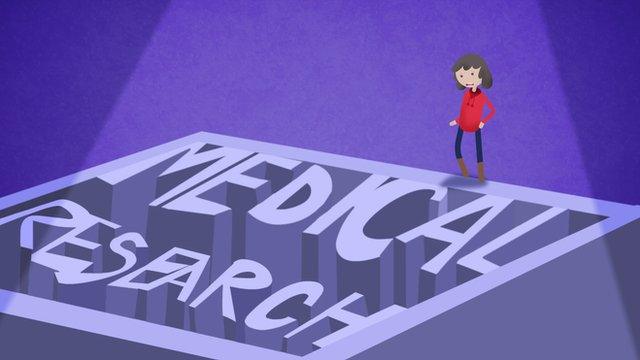Medical research with children 'must be encouraged'
- Published

There must be a culture shift in medical research to make sure more children can take part, the Nuffield Council on Bioethics says.
Without this, children's medicine lags behind adult care, and the gaps in data expose them to unknown and unnecessary risks, leading doctors warn.
For example, children may get modified doses of adult medicine that are just too high for them.
National bodies are exploring how children can help shape future studies.
'Great urgency'
Most new medicines are designed with just adult needs in mind, the report says.
And this can mean children are faced with fewer options or that doctors must sometimes give modified doses of adult drugs.
For example, newborns have just two pain-relief medicines generally available to them, while adults have more than five times that number, Prof Neena Modi, who leads the Royal College of Paediatrics and Child Health, says.
And she warns that because young people can break down drugs at different rates to adults, some children may get "extrapolated doses" of adult medicines that are too high - leaving them at risk of side-effects, or too low - resulting in poor treatment.
Experts at the Nuffield Council, who conducted a two-year inquiry involving 200 children and young people, say the situation must change.
They suggest people's reluctance to involve children can sometimes stem from the ethical considerations involved.
And while they acknowledge these can be difficult, they say this must not be used as an excuse.
They question the assumption that children should always be considered a vulnerable group that needs to be shielded from research.
Instead they urge scientists and ethics committees to consider the everyday risks children and parents are exposed too - for example while playing sport or walking to school unaccompanied.

Experts have made an animation explaining their findings
These types of scenarios must be weighed against the harm of children getting medicines that are not designed for them, they say.
And the level of involvement should be be taken into account - for example some studies might consist of surveys asking children which designs of medicines suit them best.
At the same time, pharmaceutical companies must be encouraged to do more they say. They suggest the small market share involved in the childhood population could play a part.
The report makes other recommendations, including involving children and their parents in the design of trials early on.
'Welcome addition'
And European regulations could be modified so fewer waivers are granted to companies conducting solely adult studies.
Simon Dengri, of the National Institute for Health Research, added: "The report is a welcome addition to the many voices urging the community to get better at involving young people in research, whilst recognising the excellent work that's already gone on.
"We're already talking to people in the field to see how we might ensure children's voices help shape the health research that affects them."
Prof Paul Workman, of the Institute of Cancer Research, added his support.
He said: "The case for the development of safer and more effective targeted drugs for cancer in children is overwhelmingly clear and without question of great urgency."
And Prof Modi said: "Of course decisions involving children are never easy, but this should not be an excuse for inaction; the danger of not developing the evidence base is far greater than the risks of recruiting young people to well-run, carefully regulated programmes."
- Published2 July 2010